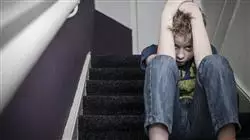University certificate
Accreditation/Membership

The world's largest faculty of psychology”
Introduction to the Program
The Advanced master’s degree in Clinical Psychology and Child and Adolescent Psychopathology will allow you to acquire the most up-to-date specialization in all areas of this work; a special training, of greater intensity, duration and educational impact, created to provide a highly qualified response to the most demanding professionals"

In this Advanced master’s degree in Clinical Psychology and Child and Adolescent Psychopathology, the psychologist will be able to incorporate all the knowledge within the diagnoses suggested in the I.C.D.-10 or the D.S.M. V and include them in the model of time-limited psychotherapy.
As a educational institution, it is essential for us to teach the psychologists who study this Advanced master’s degree the different components in the psychological treatment of children and adolescents, to know the logic and processing in the child and adolescent brain, as well as their particular strategies of behavior and interaction in the psychosocial relationship. All this knowledge is crucial to successfully carry out psychological intervention of a child or adolescent.
From our experience we know that the therapist's personal skills are crucial, that's why this syllabus includes multiple strategies and skills to achieve an effective bond both in the evaluation and diagnosis, as well as in the intervention with this type of patient.
Clinical Psychology in this historic moment should provide the student with not only a theoretical-scientific framework, but also with the skills to address mental illnesses in an effective way and thus make them successful evaluators as well as the instigators of change in a patient. These changes could be both in their behavioral component and in their traumatic memories that lead to cycle of suffering and emotional isolation.
Child and adolescent psychopathology can only be fully understood from an integral and evolutionary point of view. Childhood personality is determined within psychological and psychopathological experiences. Adaptation will not be understood without the keys to the infant's emotional and cognitive dynamism. Numerous real clinical cases, broken down in detail in all the diagnostic, intervention and family framing actions, make this a unique teaching.
We know that psychopathology in general and child and adolescent psychopathology in particular, is not static, as it depends on the permanent evolution of our society, with the result that in recent decades there have been changes in the way children and adolescents relate to each other, both in terms of health and disease.
An Advanced master’s degree created especially for professionals seeking the highest qualification, with the best didactic material, working on real clinical cases and learning from the best professionals in the field”
This Advanced master’s degree in Clinical Psychology and Child and Adolescent Psychopathology contains the most complete and up-to-date program on the market. The most important features include:
- Development of cases or situations presented by experts in the different specialties
- Graphic, schematic, and highly practical contents
- News, advances and new ways of working
- Presentation of practical workshops on the application of the techniques and methodologies presented
- Real high-resolution images in demonstrations
- Practical exercises where the self-evaluation process can be carried out to improve learning
- Algorithm-based interactive learning system for decision- ability to making in the situations which are presented to the student
- Theoretical lessons, questions for experts, discussion forums on controversial issues and individual reflection work
- Availability of content from any fixed or portable device with internet connection
This Advanced master’s degree is the best investment you can make when selecting a refresher program, for two reasons: in addition to updating your knowledge in Clinical Psychology and Child and Adolescent Psychopathology, you will obtain a qualification endorsed by TECH Global University"
The teaching staff includes professionals from the field of psychology, who bring their experience to this specialisation’s program, as well as renowned specialists from leading scientific societies.
The multimedia content developed with the latest educational technology will provide the professional with situated and contextual learning, i.e., a simulated environment that will provide an immersive training program to train in real situations.
This program is designed around Problem-Based Learning, whereby the psychologists must try to solve the different professional practice situations that arise throughout the program. For this reason, they will be assisted by an innovative, interactive video system created by renowned and experienced experts in the field of Clinical Psychology and Child and Adolescent Psychopathology, with extensive teaching experience.
Take the opportunity to learn about the latest advances in Clinical Psychology and Child and Adolescent Psychopathology and improve your skills by mastering the latest techniques: the surest way to position yourself among the best"

Increase your decision-making confidence by updating your knowledge through this Advanced master’s degree program created to train the best"
Why study at TECH?
TECH is the world’s largest online university. With an impressive catalog of more than 14,000 university programs available in 11 languages, it is positioned as a leader in employability, with a 99% job placement rate. In addition, it relies on an enormous faculty of more than 6,000 professors of the highest international renown.

Study at the world's largest online university and guarantee your professional success. The future starts at TECH”
The world’s best online university according to FORBES
The prestigious Forbes magazine, specialized in business and finance, has highlighted TECH as “the world's best online university” This is what they have recently stated in an article in their digital edition in which they echo the success story of this institution, “thanks to the academic offer it provides, the selection of its teaching staff, and an innovative learning method aimed at educating the professionals of the future”
A revolutionary study method, a cutting-edge faculty and a practical focus: the key to TECH's success.
The most complete study plans on the university scene
TECH offers the most complete study plans on the university scene, with syllabuses that cover fundamental concepts and, at the same time, the main scientific advances in their specific scientific areas. In addition, these programs are continuously being updated to guarantee students the academic vanguard and the most in-demand professional skills. In this way, the university's qualifications provide its graduates with a significant advantage to propel their careers to success.
TECH offers the most comprehensive and intensive study plans on the current university scene.
A world-class teaching staff
TECH's teaching staff is made up of more than 6,000 professors with the highest international recognition. Professors, researchers and top executives of multinational companies, including Isaiah Covington, performance coach of the Boston Celtics; Magda Romanska, principal investigator at Harvard MetaLAB; Ignacio Wistumba, chairman of the department of translational molecular pathology at MD Anderson Cancer Center; and D.W. Pine, creative director of TIME magazine, among others.
Internationally renowned experts, specialized in different branches of Health, Technology, Communication and Business, form part of the TECH faculty.
A unique learning method
TECH is the first university to use Relearning in all its programs. It is the best online learning methodology, accredited with international teaching quality certifications, provided by prestigious educational agencies. In addition, this disruptive educational model is complemented with the “Case Method”, thereby setting up a unique online teaching strategy. Innovative teaching resources are also implemented, including detailed videos, infographics and interactive summaries.
TECH combines Relearning and the Case Method in all its university programs to guarantee excellent theoretical and practical learning, studying whenever and wherever you want.
The world's largest online university
TECH is the world’s largest online university. We are the largest educational institution, with the best and widest online educational catalog, one hundred percent online and covering the vast majority of areas of knowledge. We offer a large selection of our own degrees and accredited online undergraduate and postgraduate degrees. In total, more than 14,000 university degrees, in eleven different languages, make us the largest educational largest in the world.
TECH has the world's most extensive catalog of academic and official programs, available in more than 11 languages.
Google Premier Partner
The American technology giant has awarded TECH the Google Google Premier Partner badge. This award, which is only available to 3% of the world's companies, highlights the efficient, flexible and tailored experience that this university provides to students. The recognition as a Google Premier Partner not only accredits the maximum rigor, performance and investment in TECH's digital infrastructures, but also places this university as one of the world's leading technology companies.
Google has positioned TECH in the top 3% of the world's most important technology companies by awarding it its Google Premier Partner badge.
The official online university of the NBA
TECH is the official online university of the NBA. Thanks to our agreement with the biggest league in basketball, we offer our students exclusive university programs, as well as a wide variety of educational resources focused on the business of the league and other areas of the sports industry. Each program is made up of a uniquely designed syllabus and features exceptional guest hosts: professionals with a distinguished sports background who will offer their expertise on the most relevant topics.
TECH has been selected by the NBA, the world's top basketball league, as its official online university.
The top-rated university by its students
Students have positioned TECH as the world's top-rated university on the main review websites, with a highest rating of 4.9 out of 5, obtained from more than 1,000 reviews. These results consolidate TECH as the benchmark university institution at an international level, reflecting the excellence and positive impact of its educational model.” reflecting the excellence and positive impact of its educational model.”
TECH is the world’s top-rated university by its students.
Leaders in employability
TECH has managed to become the leading university in employability. 99% of its students obtain jobs in the academic field they have studied, within one year of completing any of the university's programs. A similar number achieve immediate career enhancement. All this thanks to a study methodology that bases its effectiveness on the acquisition of practical skills, which are absolutely necessary for professional development.
99% of TECH graduates find a job within a year of completing their studies.
Advanced Master's Degree in Clinical Psychology and Child and Adolescent Psychopathology
The recent importance of the diverse psychological care practices focused on young and child patients has given way to the emergence of countless studies and research in the area, generating, in turn, an extensive range of new methodological and protocol alternatives of great impact in the sector. Understanding the implication of this continuous evolution in the exponential growth of interest in the approach of academic updating programs that allow an optimal approach to the novelties in the area, at TECH Global University we have designed our Professional Master's Degree program in Clinical Psychology and Child and Adolescent Psychopathology. In this postgraduate program, special attention will be paid to the development of new models of cognitive therapy applied to the approach of cases of psychotic disorders affecting children and adolescents. Likewise, the following concepts will be updated: the important role of drawing, metaphor and story as some of the main tools used in modern processes of psychological intervention for children and adolescents; and the knowledge of the new possibilities of pharmacological intervention in the management of patients with disorders corresponding to acute stress disorders.
Study an online Advanced Master's Degree in Clinical Psychology and Child and Adolescent Psychopathology
Psychological intervention processes focused on child patients involve the integration of a wide range of practices, elements and tools, which are only available to professionals with a high degree of expertise and preparation. In our Advanced Master's Degree program you will acquire the set of skills, capabilities and abilities necessary for an adequate performance in the changing contexts and scenarios of the sector. In this way, the modernization of the psychologist is given priority in the following aspects: the different alternatives of approach in the management of children with oppositional defiant disorder; and the development of new techniques of psychodynamic therapies applied to the care of patients with personality disorders.







